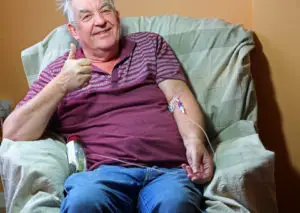Pleural Mesothelioma Treatment
Is Mesothelioma Curable?
The advanced researchers and science have failed to find a cure for mesothelioma yet with any pleural mesothelioma treatment. The prognosis of mesothelioma is poor; however, with timely diagnosis and careful treatment many patients show quite a good prognosis. Most patients who have mesothelioma are expected to live for 1 year or less after identification of the condition. The most important factors in predicting the lifespan of a patient are the stage of his pleural mesothelioma and his overall health and state of wellbeing.
Factors which affect Pleural Mesothelioma Prognosis
When a person is diagnosed with this condition, the doctor who is treating the patient with a pleural mesothelioma treatment looks for a few factors that are the primary factors to determine the prognosis for the patient:
Location of the cancer
Pleural mesothelioma that is found in the lungs has a better prognosis than the pericardial one, but it is still poor to peritoneal mesothelioma which is found in the abdominal region of the body and has a slightly better prognosis. It is also different from sarcomatoid mesothelioma.
Type of the cell
The epithelioid mesothelioma is the most common prognosis and has a better prognosis than any other kind of cell.
Stage of the cancer
If the condition is detected at an early stage, the chances of having a quality life and longer duration of life with timely pleural mesothelioma treatment options are high, although the cure for the disease is not yet possible. At stage 3 and 4, it is near to impossible to help the patient recover, and only things that can be done at that stage is to relieve the patient of the discomfort or pain he is in because of the disease. Palliative treatments in general as a pleural mesothelioma treatment, normally work to ease the patients at the last stages.
Metastasis
If the disease has spread to adjoining organs or tissues of the body, it becomes very difficult to remove it without damaging the organs, and the prognosis is worse in such cases. If cancer has begun to spread, the pleural mesothelioma treatment is aimed to reduce the symptoms and improve the quality of life.
Health of the patient
Young people who are otherwise healthy tend to cope up with a pleural mesothelioma treatment better, and they react to the treatments positively. In older patients, many problems arise, and those problems create a hurdle in the treatment process.
Types of Pleural Mesothelioma Treatment
The doctors who specialize in treating cancer have to first plan the pleural mesothelioma treatment approach to follow, and then that plan undergoes changes after observing how the patient reacts to the different treatments applied. After considering the primary factors, the doctors are in a better position to understand the condition of the patient and find a way to treat it.
Curative Pleural MesotheliomaTreatment
Doctors may use a curative pleural mesothelioma treatment to get rid of cancer from the patient’s body. Patients who have pleural mesothelioma may qualify for the curative treatments, and their surgeries may also be successful. The surgeries which are involved in the pleural mesothelioma are:
- Extrapleural pneumonectomy (EPP)
- Pleurectomy/Decortication (P/D)
Palliative Treatment
In the palliative pleural mesothelioma treatment, not much can be done and the doctor just helps the patient feel comfortable with efforts to ease his pain. The most common procedure that is used in a palliative pleural mesothelioma treatment, is to drain the fluid which fills up in the abdomen and chest as a result of cancer that is spreading.
Multimodal Therapy
In the multimodal way of pleural mesothelioma treatment, a combination of many treatments is used to help the patient. Usually, in this therapy, surgical treatment, chemotherapy, and radiation therapy work together to help improve the condition of the patient.
After having Multimodal therapy, patients have been reported to survive for more than 5 years of their expected lifespan.
What Are The Available Treatments For Pleural Mesothelioma?
Surgery
Surgery is the foremost pleural mesothelioma treatment available in stage 1 of cancer and can be equally effective in stage 2 as well. The surgery of the pleural mesothelioma is known as pleurectomy, and in this surgery, the doctors remove the lung lining in which the tumor is detected.
If there are any other visible tumors in the other linings of the mesothelium, the doctor may remove the parts of the lining of the diaphragm, pericardium and the protective lining of the heart. This does not completely remove the tumor or may not even help the patient to recover, but this can help to relieve the symptoms without sacrificing the lung. 90 percent of the patients who have undergone surgery do notice that their symptoms have reduced and their breathing function is retained.
There is another form of surgery aforementioned, the extrapleural pneumonectomy (EPP). In this procedure, a lung is removed surgically and also the nearby organs of the body which includes the diaphragm, lymph nodes, and some part of the heart lining.
This major organ and tissue removal surgery is only done in cases when the cancer is confined to a portion of the lung. However, despite the importance of this pleural mesothelioma treatment, there are still chances that the tumor may grow back.

Chemotherapy
Chemotherapy is the use of certain medications to attack and kill the cancer cells. The effectiveness of chemotherapy depends on the stage of Mesothelioma and its location. Chemotherapy works best when it is combined with certain drugs and surgery.
Doctors use chemotherapy before the surgery, during the surgery and even after the surgery. Chemotherapy has two types which are used in the pleural mesothelioma treatment:
- Systematic chemotherapy: This is administered to the patient through IV Fluids, and the medication travels through the bloodstream and kills the cancer cells which come in their way.
- Intraoperative chemotherapy: The drug is generally heated to increase the effectiveness of the drug. The heated drug is administered directly into the lung during the surgery, and it proves to be effective in killing the cancer cells most of the times.
Side Effects Of Chemotherapy
The side effects of chemotherapy as a pleural mesothelioma treatment, affect you according to your overall health and tolerance. It may affect you severely, mildly or sometimes not at all. The side effects include:
- Appetite loss
- Hair fall
- Diarrhea
- Exhaustion
- Nausea
The side effects of chemotherapy may disappear after the pleural mesothelioma treatment is complete or it may take some time. The time span of the disappearance of any side effects of chemotherapy depends on the type of medication, dosage, and the duration for which the medication is administered. Therefore in chemotherapy, as a pleural mesothelioma treatment, it cannot be well defined in advance when will the side effects disappear.

Radiation
Radiation therapy is the use of high energy rays to kill the Mesothelioma cells. Doctors may combine the radiation treatment, chemotherapy, and surgery to increase the effectiveness of the pleural mesothelioma treatment. The radiation therapy has the edge over other forms of treatment because the radiation can be directly targeted to the cancerous cells and this may prevent damage to the healthy cells and tissues. The radiation therapies which are used in pleural mesothelioma treatment for patients are:
- (IMRT) Intensity- Modulated Radiation Therapy: IMRT enables the doctors to use computers to adjust and control the amount and intensity of the radiation as it is focused on the tumor. 41 % of the patients are reported to survive an additional lifespan of three years after the IMRT is administered upon their tumor site.
- (3D-CRT) Three-dimensional Radiation Treatment: After finding the tumor location by 3D scans, the intensity of the radiation is managed. The size of the tumor is also be regarded when determining the intensity and dosage of the radiation. The doctors are able to target the tumor cells, and the pleural mesothelioma treatment minimizes damage to the healthy tissues and non-cancerous cells that are near the tumor site.
Side Effects Of Radiation Therapy
In radiation therapy, as a pleural mesothelioma treatment, there are chances that a high intensity of radiation might be required to kill the cancer cells. As the amount of radiation and its intensity is increased, the healthy cells also get damaged, unfortunately. This may cause certain side effects like:
- Redness of the skin
- Inflammation
- Inflammation of the esophagus
- Exhaustion
- Hair loss
- Nausea
Multimodal Treatment
Multimodal treatment is considered the most effective way of pleural mesothelioma treatment. It combines several treatment methods. Surgery with chemotherapy is combined with the more effective killing of the cancerous cells and the removal of the tumor affected parts of the body.
Experimental pleural mesothelioma treatment approaches like immunotherapy and gene therapy can also be combined for an effective approach toward treating the disease. Your doctor may choose a multimodal treatment by looking at certain factors. These factors include the type of mesothelioma, the stage of cancer and the overall health of the patient.
If the body of the patient is not tolerant enough to endure the high-intensity treatments altogether, the aggressive multimodal pleural mesothelioma treatment may not be an option for that patient. The patient’s medical history is also taken into observation when choosing this type of treatment.
Many patients cannot simply afford the cost of multimodal treatments, and they might disregard it for the very reason. Insurance companies may not pay for the pleural mesothelioma treatment in the United States or may just pay some amount for the treatment, which might not be enough in the long run.
Clinical Trials and Pleural Mesothelioma Treatment
Researchers are continuously struggling hard to find an effective way to cure this type of affection in the pleura with diverse researched pleural mesothelioma treatment options. However, they have failed to do so far. There are three stages that can be carried out before receiving the approval of the FDA.
Stage 1
In stage 1 of a clinical trial, the correct dosage and safety of the drug are determined by the doctor. Researchers may want to find out how human beings may react to a drug and what can be the consequent side effects of the drug on the patient. Firstly, the dose of the drug administered is slow, in order to reduce the adverse effects. The dosage is slowly increased to find the required dosage of the drug for its effectiveness to take place.
Stage 2
Stage 2 is a longer phase of the clinical trial. Researchers focus on how the disease is responding to a particular pleural mesothelioma treatment. Even the highest dose of medication may be administered in this phase which is determined previously to be safe. Patients are kept under close observation, and they are monitored to find out the effectiveness. The overall health of the patient is also examined regularly in order to know any adverse side effects of the pleural mesothelioma treatment.
Stage 3
In the stage, the drugs are compared to each other in effectiveness. If an existing treatment is available, it is compared to the treatment that was administered in stage 2 to treat the disease. Researchers carefully observe the patients and then reach a conclusion. The treatment is immediately stopped if any adverse side effects are seen on any patient. The research may be suspended if a positive response to the pleural mesothelioma treatment is not seen as a clear rate.
Who Can Participate In These Clinical Trials?
Not everyone affected with mesothelioma is eligible to participate in the clinical trial. There are certain requirements that every participant should meet. The factors that are taken into account at first are the treatments that are already been taken for treating cancer, the stage of the mesothelioma and cell type of pleural mesothelioma. Age and gender also matter in order to know if the patient is eligible for a clinical trial.
There are certain side diseases that cannot endure the intensity of the pleural mesothelioma treatment and the patients with those diseases are not eligible for a clinical trial.
Experimental Pleural Mesothelioma Treatment Approaches
Immunotherapy
Immunotherapy is more like a natural way to treat the tumor. It is also known as biological therapy as it boosts the immune system of the patient to treat the cancerous cells. It has not proved yet effective as a pleural mesothelioma treatment.
Immunotherapy involves vaccine therapy in which the patient is injected certain vaccines that can be acquired from the patient himself and these vaccines work by stimulating the immune response of the body. This helps to fight the cancer cells and kill them in an effective manner. Immunotherapy can be combined with chemotherapy to increase the effectiveness, and it helps in increasing the lifespan of the patient by 1 to 2 years approximately.
Immunotherapy is regarded as the experimental pleural mesothelioma treatment. It is also known as a biological treatment for cancer. It is still in the experimental stages and has not received a final verdict because of a lack of clinical trials and other criteria.
So in immunotherapy, as we have discussed earlier, one of its characteristics, is that the immune system is boosted and the patient is injected with certain vaccines in order for the immune system of the patient to start reacting to cancerous cells and fight them.
Gene therapy
Cancer occurs as a result of a malfunction of the genetic cells and mutation which makes cells multiply rapidly. In the gene therapy, used as a pleural mesothelioma treatment, the faulty genes are replaced by normal and healthy ones in order to make them work normally and stop the abnormal multiplication of cells. Gene therapy includes:
Suicide Gene therapy:
In the Suicide Gene therapy, the suicide genes are triggered. When these genes are activated, they make the cells to die ultimately. In a particular type of Suicide Gene therapy, the cancer cells are altered in such a way that the cancer cells produce an enzyme that causes their own destruction. As the name of the therapy suggests, the cells commit suicide.
Cytokine Gene therapy:
In this gene therapy, the immune system of the body is triggered. The cytokines are released into the tumor cells, and the immune system reacts to it. The immune system then works to kill and attack those cancerous cells.
Tumor-based p53 Gene therapy:
The p53 treatment has failed to show any effectiveness in the treatment of the cancer cells. This is on the list because the researchers have a strong belief that if they are able to repair the p53 gene, they can actually find a cure for all types of mesothelioma, and furthermore, this will be the definitive pleural mesothelioma treatment.
Photodynamic therapy
Photodynamic therapy uses a photosensitizing agent that produces a type of oxygen after exposure to a certain kind of light that tends to kill the cancerous cells. It can damage the blood vessels that feed the cancerous cells and trigger the tumor. Photodynamic therapy is a pleural mesothelioma treatment said to improve the quality of life of patients of mesothelioma and can alleviate its symptoms as well.
Life Expectancy And Survival Rate of Mesothelioma Patients
Life expectancy means an average time that a person is expected to live after a certain potentially fatal disease is diagnosed. Sometimes the patient’s tolerance is not that strong, and his health deteriorates further with the mesothelioma treatments that are available to deal with his condition. The life expectancy of a person drops significantly by four years after he is diagnosed with pleural mesothelioma. According to the research data, most patients just survive for 12 months, and they can carry their life for up to 21 months with improved tolerance to a pleural mesothelioma treatment.
However, the data by the researchers is not a verdict of your fate and future. There are cases reported of people, who have fought their tumor bravely and with full willpower. They were able to take their lifespan to another decade. Improved researches on the pleural mesothelioma treatment variations and emerging drugs are helping patients improve their overall health and thus improve their life expectancy as well.
Cases have been reported where patients have lived through their symptoms of pleural mesothelioma and have survived for quite a good duration with the disease. The cure for the disease is not yet available or discovered, but a pleural mesothelioma treatment helps in increasing your life expectancy.
The following steps can help you live a quality life with your loved ones despite being diagnosed and increase your chances of survival in a more healthy way:
- Consult another Mesothelioma specialist and take a second opinion: This may help because there is a chance that the first doctor might have missed a few things as daily new researches, and new pleural mesothelioma treatment approaches are being carried out to treat the disease. The second doctor might be able to advise you better treatments.
- Choosing the best treatment options for yourself: You can ask your doctor for the available pleural mesothelioma treatment options for you. You can discuss the effectiveness of each treatment, and you can also have your doctor’s opinion on how he thinks you would be treated in the best manner. You can choose the best treatments for yourself.
- Participate in clinical trials: During the clinical trials, many new findings are tested on the new patients that often turn out to be very effective in treating the patients. You can choose to improve the research by participating in the clinical trials.
- Consulting a palliative care doctor: A palliative care doctor helps you improve the quality of your life. He brings hope into your eyes and at the same time, he suggests changes in your lifestyle to make the symptoms of the disease more bearable and easy.
- Improving diet: You can quit all the artificial things from your diet. Natural and organic products are always the best. The genetically modified food is less in nutrition and contains factors that trigger your tumor cells. You can opt for organic food items and acquire a healthier lifestyle for yourself. Of course that apart from following this advice, also it is required that you follow a pleural mesothelioma treatment.
- Boost your immunity: There are certain ways in which you can boost your immunity. You can consult a nutritionist to know about the foods that you can intake to improve your immunity. Add vitamin C to your diet to make your immune system stronger. When the immune system becomes strong, it might help in killing the cancerous cells, and your body might be able to deal with the side effects of the pleural mesothelioma treatment in a better way.
- Spend more time with your loved ones: This is a natural reliever, and you can pave away all your stress by doing that. The love and attention that you receive from your loved ones is the one thing that you require to be healthy again. Emotions play an important role in improving the overall health of the body.
Approximate Cost Of The Treatments
The cost of the pleural mesothelioma treatment in the United States may vary according to the stage of cancer and also to the treatment you choose for yourself. Cancer treatment is overall expensive and insurance companies may pay in some amount but will not be able to pay for the complete treatment.
Surgery:
Surgery for pleural mesothelioma can cost you thousands of dollars. Exact costs can only be determined by the hospital where you are supposed to have the surgery. The average cost of the surgery is about 40,000 $.
Chemotherapy:
The costs of chemotherapy cannot be exactly determined. It depends on the drugs that are prescribed to you during the treatment. The treatment can go up to as high as $30,000 for an eight-week chemotherapy session. The initial pleural mesothelioma treatment cost is roundabout seven thousand dollars.
Radiation:
Sophisticated and highly technical equipment is used in radiation therapy. This treatment is very expensive. The cost of the treatment may depend on the number of treatment sessions and the type of radiation that is to be used. Radiation therapies for pleural mesothelioma can be covered by the insurance companies, and this may be around 2000$ for the month. It cannot be determined how much the complete pleural mesothelioma treatment may cost.
Management of Treatment of Costs
Many health insurance companies may cover some part of the treatment for you, but patients will still be facing financial constraints especially when they face the hidden costs of the treatments.
Government assistance:
There are programs made by the government such as social security disability and VA Benefits in which the federal government may help you to face the pleural mesothelioma treatment. If you meet the disability standard, you can receive a monthly income from the federal government which would help you to pay your hospital expenses to a great extent. If you are a veteran, the Department of VA may help you financially. There is a certain criterion for everything which you should meet in order to be eligible for such help.
Nonprofit organizations:
Various NGOs are working in the corporate sector to help cancer patients in a number of ways. however, we could not find any related to pleural mesothelioma treatment.
Clinical trials:
Clinical trials involve the patients to offer themselves for research. These trials may be helpful for the patient himself, but it is extremely valuable for future patients and treatment research. Though the clinical trials have a strict criterion and not every patient is eligible for a trial, but you can always check for a clinical trial that is looking for participants. In the clinical trial, the patient does not have to pay for any expenses of the treatment, and he is kept under strict observation as the clinical findings are recorded every now and then to improves the research.
Conclusion
Pleural mesothelioma is rare and is not that common. This cancer is, unfortunately, a fatal disease and rapidly aggravates the symptoms of the patient. The diagnosis of the pleural Mesothelioma is often delayed because of the long latent period that occurs between the onset of the disease and the appearance of the first symptoms of the disease.
Though this disease is not curable, research on a regular basis is being carried out to reach a cure for the disease. Currently, Mesothelioma patients can only be helped by prescribing them certain pleural mesothelioma treatment options that help in easing the symptoms and increase their life expectancy.
Though the life expectancy is gradually improving, the future prospects are bright for the treatment as well. Clinical trials are encouraged to help the research and find a permanent cure for the malignant disease.




